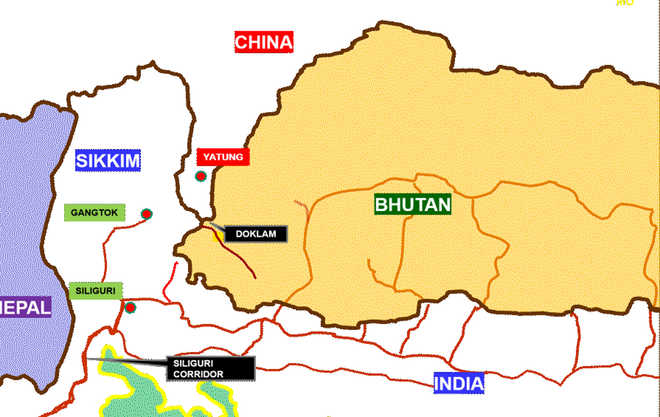
WHILE the nation’s attention is sought to be riveted on an organised jumlagiri around the GST, a serious security situation has been developing in the Doklam sector on the China-Bhutan (India) border since June 16. Tempers are running high. The Chinese, always good at tweaking perceptions, have found a lame excuse to block the Kailash Mansarovar yatra through the Nathu La route. The Indian Army and the PLA have come in eyeball to eyeball confrontation, with neither side willing to blink first. In a show of combativeness, the Indian Army Chief has been asked to visit Bhutan. The Chinese side has provocatively sought to remind the Indian Army of ‘historic lessons’; the PLA spokesperson had deliberately directed his remarks at the Indian Army Chief, Gen Bipin Rawat, perhaps in the knowledge that the good General does not easily back away from a verbal duel.
If there is any ‘historic lesson’ for the two countries to learn, it is this: ensure that rhetorical excesses do not snowball into an unthought and unsought and unplanned conflict. We in India are far more vulnerable on this count because of our democratic habits and practices. In recent years in our domestic politics we have been prone to talk in macho terms; large chunks of our national media takes pride in talking tough and rough towards ‘enemies’ at home and abroad. The most formidable strategic challenge before the political leadership is how not to fall in the trap of this hyper-nationalistic grandiloquence.
Fortunately, on Friday the two foreign offices raised their voice; the Indian side expressing its deep concern and clearly stating that China’s road building activities in the Doklam sector would mean a significant —and, perhaps, unacceptable — change in the status quo; and, the Chinese noting that ‘diplomatic channels are unimpeded’ between the two countries. The stand-off at Doklam has to be seen in the larger context of divergence in geostrategic pursuits and posturing by New Delhi and Beijing. The Chinese may feel they are entitled to feel peeved at New Delhi’s unwillingness to be impressed with Beijing’s superpower assertiveness; and, on its part, India is entirely within its right to proactively protect and enlarge New Delhi’s strategic footprints. All the more reason, diplomacy’s creative instrumentalities should not be allowed to get pre-empted.



























